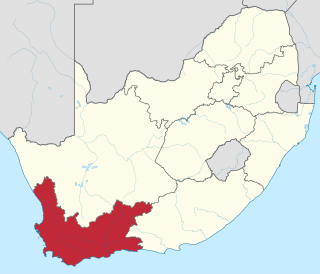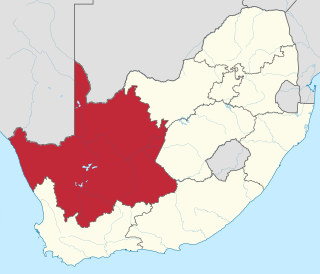
Cape Town is the legislative capital of South Africa. It is the country's oldest city and the seat of the Parliament of South Africa. It is the country's second-largest city, after Johannesburg, and the largest in the Western Cape. The city is part of the City of Cape Town metropolitan municipality.

South Africa is divided into nine provinces. On the eve of the 1994 general election, South Africa's former homelands, known as Bantustans, were reintegrated into the country, and the four provinces were increased to nine by dividing Cape Province and the Transvaal into three and four, respectively. The twelfth, thirteenth and sixteenth amendments to the Constitution of South Africa changed the borders of seven of the provinces.

According to the 2022 census, the population of South Africa is about 62 million people of diverse origins, cultures, languages, and religions. The South African National Census of 2022 was the most recent census held; the next will be in 2032.

Gauteng is one of the nine provinces of South Africa.

The Eastern Cape is one of the nine provinces of South Africa. Its capital is Bhisho, but its two largest cities are East London and Gqeberha. Due to its climate and nineteenth century towns, it is a common location for tourists. It is also known for being home to many anti-apartheid activists, the most famous being Nelson Mandela hailing from the province.

The Western Cape is a province of South Africa, situated on the south-western coast of the country. It is the fourth largest of the nine provinces with an area of 129,449 square kilometres (49,981 sq mi), and the third most populous, with an estimated 7 million inhabitants in 2020. About two-thirds of these inhabitants live in the metropolitan area of Cape Town, which is also the provincial capital. The Western Cape was created in 1994 from part of the former Cape Province. The two largest cities are Cape Town and George.

Limpopo is the northernmost province of South Africa. It is named after the Limpopo River, which forms the province's western and northern borders. The capital and largest city in the province is Polokwane, while the provincial legislature is situated in Lebowakgomo.

The Northern Cape is the largest and most sparsely populated province of South Africa. It was created in 1994 when the Cape Province was split up. Its capital is Kimberley. It includes the Kalahari Gemsbok National Park, part of the Kgalagadi Transfrontier Park and an international park shared with Botswana. It also includes the Augrabies Falls and the diamond mining regions in Kimberley and Alexander Bay.

The Nelson Mandela Bay Municipality is one of eight metropolitan municipalities in South Africa. It is located on the shores of Algoa Bay in the Eastern Cape province and comprises the city of Gqeberha, the nearby towns of Uitenhage and Despatch, and the surrounding rural area.
White South Africans generally refers to South Africans of European descent. In linguistic, cultural, and historical terms, they are generally divided into the Afrikaans-speaking descendants of the Dutch East India Company's original settlers, known as Afrikaners, and the Anglophone descendants of predominantly British colonists of South Africa. In 2016, 57.9% were native Afrikaans speakers, 40.2% were native English speakers, and 1.9% spoke another language as their mother tongue, such as Portuguese, Greek, or German. White South Africans are by far the largest population of White Africans. White was a legally defined racial classification during apartheid.

Crime in South Africa includes all violent and non-violent crimes that take place in the country of South Africa, or otherwise within its jurisdiction. When compared to other countries South Africa has notably high rates of violent crime and has a reputation for consistently having one of the highest murder rates in the world. The country also experiences high rates of organised crime relative to other countries.

Nyanga is a township in the Western Cape, South Africa. Its name in Xhosa means "moon" and it is one of the oldest black townships in Cape Town. It was established as a result of the migrant labour system. In 1948 black migrants were forced to settle in Nyanga as Langa had become too small. Nyanga was one of the poorest places in Cape Town and is still one of the most dangerous parts of Cape Town. In 2001 its unemployment rate was estimated at being approximately 56% and HIV/AIDS is a huge community issue.

The South African National Census of 2011 is the 3rd comprehensive census performed by Statistics South Africa.

Book fairs and literary festivals are held throughout South Africa each year to promote literacy among children and adults. A country's literacy rate is often a key social indicator of development. In 2005, UNESCO Institute for Statistics reported a literacy rate of 94.37% among the population aged 15 years and older. The literacy rate among the male population in this age group was 95.4% and 93.41 for female counterparts. According to Statistics South Africa, functional illiteracy among those aged 20 years or older, was recorded at 15.4% in 2005. This has improved from 2002's 27.3%. Women are more likely to be functionally illiterate across all age groups, apart from those aged between 20 and 39 years old.
Makotopong is a village located 30 km outside the town of Polokwane within the province of Limpopo in South Africa. Makotopong falls under the Polokwane Local Municipality.
General elections will be held in South Africa on 29 May 2024 to elect a new National Assembly as well as the provincial legislature in each province. These will be the seventh general election held under the conditions of universal adult suffrage since the end of the apartheid era in 1994. The new National Council of Provinces will be elected at the first sitting of each provincial legislature. Ever since the first post-apartheid election in 1994, the African National Congress has held a majority of seats in the National Assembly.

Cape independence, also known by the portmanteau CapeXit, is a political movement that seeks the independence of the Western Cape province from South Africa.















